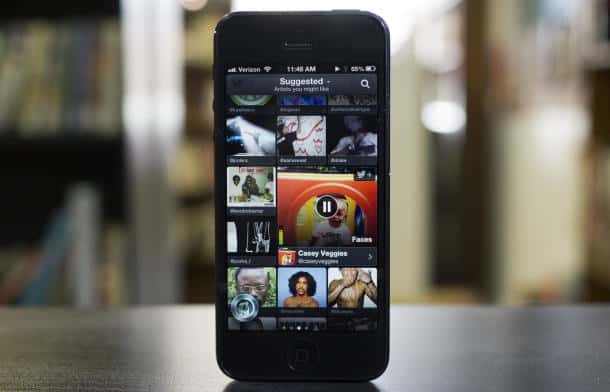Will Twitter’s #Music finally put iTunes out of its misery?


Twitter’s new music recommendation and streaming service arrived last Thursday, promising to rearrange the charts to reflect a more intuitive picture of fan engagement with music.
What differentiates #Music is that it is available as a standalone app, demonstrating Twitter’s innate understanding that the future of media consumption (and serving ads to people who consume that media) is mobile. By contrast, Facebook’s recently launched music news feed remains within the larger framework of Facebook. It will be interesting to see which service gains traction over the coming months.
The app presents the user with four sections: “Popular”, which displays a numbered chart arranged by top-trending songs; “Emerging”, which promises to dig up the “hidden talent found in the tweets”; “Suggested”, which displays tracks you might like based on previous behaviour; and “#NowPlaying”, which shows you which tracks are being tweeted by people you follow.
Social media analytics company Simply Measured has broken down the numbers from the first 24 hours of Twitter users sharing links using #Music. Surprisingly, links shared using the Spotify music service barely outnumbered iTunes (11,984 vs. 11,612). Annoyingly for Canadians, Spotify is unavailable, so how it managed to edge out iTunes in what should have been a cakewalk for Apple’s über-music service remains a mystery. Rdio, which is available in Canada, came in a distant 3rd place, with 3,457 shares.
#Music came about when Twitter acquired an Australian music tracking service called We Are Hunted, quickly shut it down and folded it in to Twitter proper, much the way it absorbed video service Vine.
So is Twitter’s new music service an attempt to eradicate iTunes, or to resuscitate it? What’s likely to kill the clunky and much maligned iTunes, if it can be killed, is that Twitter #Music is platform agnostic. Even if you don’t sign up for a Twitter account, you can still sample music on the front page. iTunes, like all of the Apple ecosystem, depends on proprietary formats and also on the idea of users owning their own collection of songs, whereas services like Spotify and Rdio can be streamed across devices and platforms.
While Twitter’s #Music currently steers users towards Spotify, Rdio and iTunes to actually purchase tracks they like, is it only a matter of time before we see Twitter move into virtual record store territory itself, like Apple almost accidentally did before it?
One thing Twitter’s new service has going for it is timing. The backlash against iTunes grew to a roar when it released iTunes 11 late last year. In a piece for Slate called “Won’t Someone Take iTunes Out Back and Shoot It?” tech writer Farhad Manjoo captured what a lot of people are thinking about the once convenient service that now lumbers forward like one of the zombies from “The Walking Dead”.
“Each new upgrade brings more suckage into your computer,” he said. “It makes itself slower. It adds three or four more capabilities you’ll never need. It changes its screen layout in ways that are just subtle enough to make you throw your phone at the wall. And it adds more complexity to its ever-shifting syncing rules to ensure that the next time you connect your device, you’ll have to delete everything and resync. At this point, you shake your fists and curse this foul program to the heavens: iiiiiiiiiiiiiTuuuuuuuuuuunes!!!”.
It sounds like a sunset showdown is set to happen whenever Twitter IPOs, but, for now, no one will admit it. Twitter CEO Dick Costolo, responding to persistent rumours that the company is set to go public this year, insists that micro-blogging service has plenty of financing from investors to carry it through the indefinite future. Its ad revenues alone are expected to more than double to $583 million, from $283 million last year. New initiatives like #Music are likely to draw the eyeballs necessary to fuel that revenue. Perhaps not completely coincidentally, Twitter last week announced a new method of ad targeting (beefing up what it already refers to as “promoted tweets”) based on user keywords, and certainly meant to siphon the same kind of advertisers who are already tapping in to Facebook’s ad exchange.
iTunes, meanwhile generated $4.114 billion in revenue for Apple in its recently released Q2.
While Twitter’s #Music currently steers users towards Spotify, Rdio and iTunes to actually purchase tracks they like, is it only a matter of time before we see Twitter move into streaming virtual record store territory itself, like Apple almost accidentally did before it? The accumulation of user data will itself become extremely valuable for advertising purposes as the service rolls along, and that advantage is not shared by traditional media, which relies on third-party services to measure popularity.
Streaming services like Spotify, Pandora and Lastfm have gained so much traction with a model that has users pay a monthly fee to access their music rather than own it, that Apple’s hand has been forced, and the Cupertino tech giant is now rumoured to be close to launching its own streaming service.
These upstart streaming services must have at first seemed like a particularly pesky insect to Apple, but with their business models proven out, Apple now has real reason to fear one that attaches the proven demand for streaming services to a user base of 200+ million, the way Twitter does. Twitter’s advantage is further compounded by the fact that it doesn’t have a recent history of frustrating and confounding its users, which has forced some back to earlier versions of iTunes. Apple’s streaming service, which will go head-to head with Twitter’s, will reveal just how much the iTunes brand has been compromised. My suspicion: a lot.

Terry Dawes
Writer
